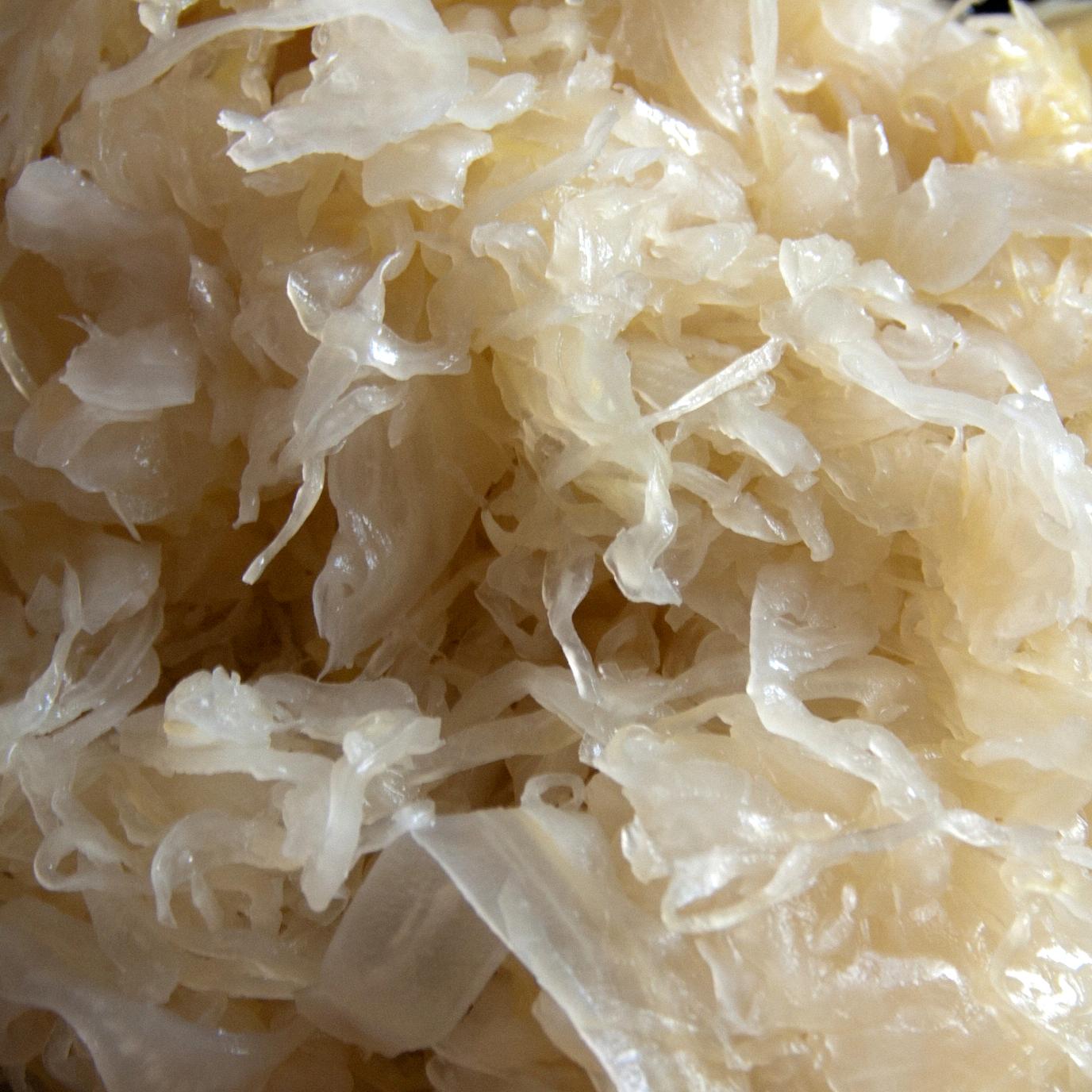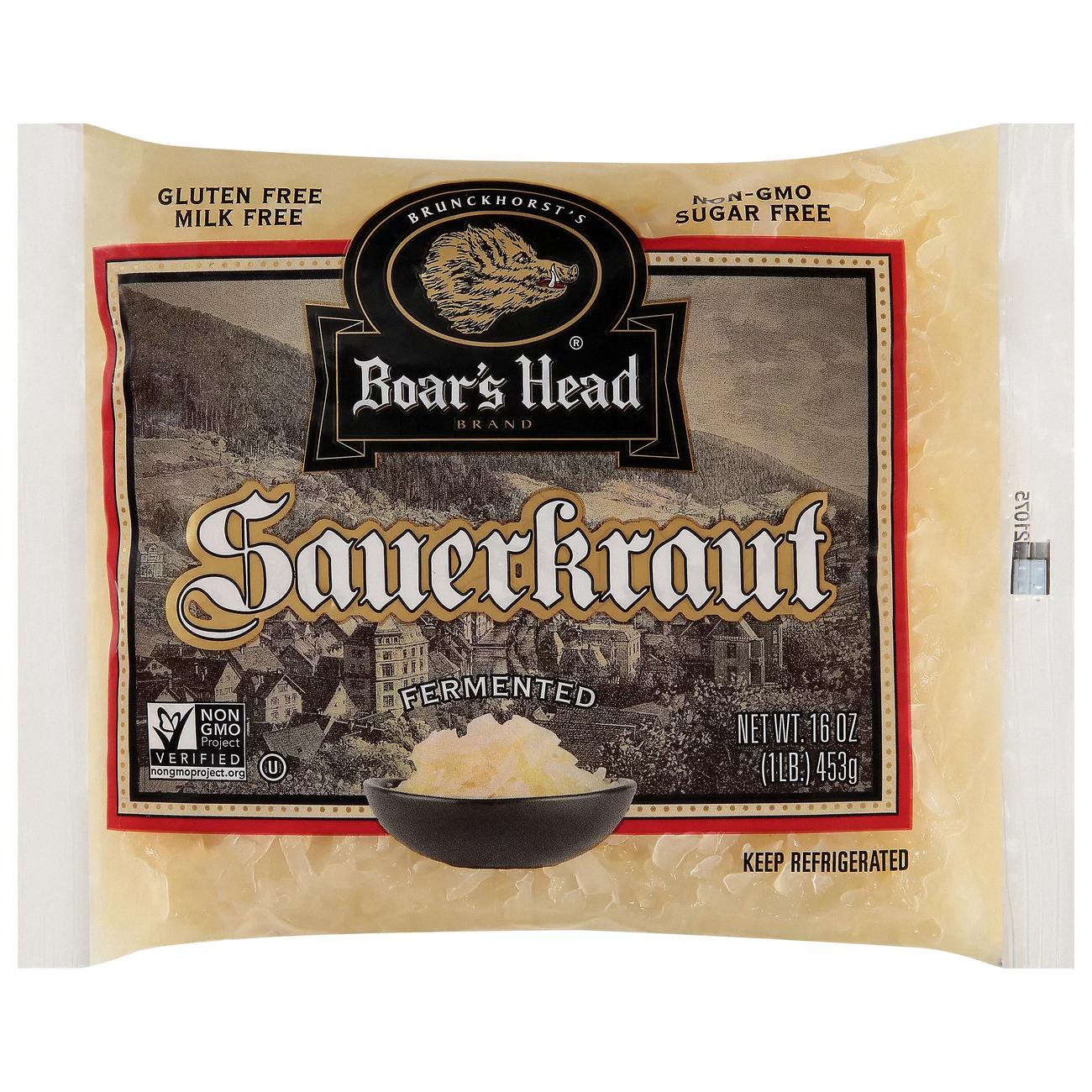Sauerkraut, a German word meaning “sour cabbage,” is a fermented food made from cabbage that has been shredded and salted. The process of fermentation gves this dish a tangy and sour taste, and also makes it rich in probiotics, which are beneficial for gut health.
One of the most common questions about sauerkraut is whether it is typically eaten hot or cold. The truth is, sauerkraut can be enjoyed both ways, depending on personal preference and the recipe being used.
Cold Sauerkraut:
Cold sauerkraut is often used in salads, sandwiches, and as a condiment. It is also commonly eaten straight from the jar as a healthy snack. Cold sauerkraut is a great addition to any dish that could use a tangy crunch or a boost of probiotics.
Hot Sauerkraut:
Hot sauerkraut is often served as a side dish, especially with meats such as sausages or pork chops. It can also be used as a topping for hot dogs or burgers. The heat helps to enhance the flavor of the sauerkraut, and makes it a comforting and filling addition to any meal.
Here are some tips to help you prepare and enjoy sauerkraut:
– If you are using canned sauerkraut, it is already cooked and can be eaten straight from the can. However, if you prefer it warm, you can heat it up in a saucepan over medium heat for a few minutes.
– If you are using fresh sauerkraut, be sure to rinse it thoroughly before using to remove excess salt and debris.
– Sauerkraut pairs well with many foods, including potatoes, eggs, avocado toast, and rice bowls. Get creative and experiment with different flavor combinations.
– If you are new to sauerkraut, start with small amounts and gradually increase your intake to avoid any digestive discomfort.
Sauerkraut is a versatile and nutritious food that can be enjoyed both hot and cold. Whether you prefer it as a side dish or a condiment, sauerkraut is a great way to add some tangy flavor and probiotics to your meals. Give it a try and see how you can incorporate this delicious dish into your diet.
Warming Up Sauerkraut: Is it Necessary?
Sauerkraut is a fermented cabbage that can be enjoyed both cold or warm. While it is not necessay to warm up sauerkraut before consuming it, many people prefer to do so for its enhanced flavor and texture. When sauerkraut is heated, the seasoning is activated, and the flavors become more pronounced. Additionally, warming up sauerkraut makes it a great side dish to accompany hot meals like sausages, pork chops, or mashed potatoes. However, if you prefer to eat sauerkraut cold, it can be added to salads or sandwiches, providing a tangy and refreshing flavor. Ultimately, whether to warm up sauerkraut or not is a matter of personal preference, and it can be enjoyed either way.

Source: allrecipes.com
The Best Way to Enjoy Sauerkraut
When it comes to sauerkraut, there are many different ways to enjoy this tangy and delicious dish. One of the most popular ways to eat sauerkraut is as a side dish to a larger meal. Simply add a spoonful or two of sauerkraut to your plate alonside your main course, such as grilled chicken or fish.
Another great way to enjoy sauerkraut is to use it as a topping for guacamole. The combination of creamy avocado and tangy sauerkraut is sure to be a hit. You can also add sauerkraut to your morning egg scramble for a flavorful and nutritious breakfast.
If you’re a fan of avocado toast, try adding sauerkraut on top for an extra zing of flavor. Similarly, sauerkraut makes a great addition to salads and sandwiches, adding a crunchy texture and tangy taste.
For a heartier meal, consider adding sauerkraut to a rice bowl or serving it alongside roasted potatoes. And if you’re looking for a unique and tasty dip, try mixing sauerkraut with sour cream or cream cheese.
Ultimately, the best way to eat sauerkraut is whichever way you enjoy it most. With so many different ways to prepare and serve this versatile dish, you’re sure to find a recipe that suits your taste buds.
Eating Sauerkraut Traditionally
Sauerkraut, a traditional German dish, is typically eaten as a side dish or condiment. It is often served alonside pork dishes, such as sausages or roasted pork, as the tangy flavor of the sauerkraut complements the richness of the meat. Sauerkraut can also be used as a topping for hot dogs or sandwiches, adding a flavorful and crunchy element. Additionally, sauerkraut can be cooked into soups or stews, with the acidity of the sauerkraut adding a depth of flavor to the dish. Overall, sauerkraut is a versatile ingredient that can be enjoyed in a variety of ways, both as a standalone dish or as an accompaniment to other foods.
Eating Sauerkraut Straight From the Jar: Is It Safe?
Yes, you can eat sauerkraut straight from the jar. Sauerkraut is a fermented food made from finely chopped cabbage that has been pickled with salt and water. It is a popular condiment and ingredient in many dishes, and is also enjoyed as a snack. Sauerkraut is generally safe to eat straight from the jar, as it is already cooked during the fermentation process. However, it is important to note that sauerkraut may contan high levels of sodium, so it is recommended to consume it in moderation. Additionally, some people may find the strong, tangy flavor of sauerkraut to be an acquired taste.
The Benefits of Sauerkraut for Healing the Gut: How Long Does it Take?
Sauerkraut is a fermented food that is rich in probiotics, which are beneficial microbes that can help to improve the health of your gut by crowding out harmful bacteria and promoting a healthy balance of gut flora. However, the length of time it takes for sauerkraut to heal your gut can vary depending on a number of factors, including the severity of your gut issues, the amount of sauerkraut you consume, and how regularly you consume it.
Typically, it can take anywhee from a few weeks to several months of consuming sauerkraut regularly to experience significant improvements in gut health. It is important to note that sauerkraut should be consumed as part of a balanced diet that includes a variety of other healthy foods to support overall gut health.
It’s also worth noting that sauerkraut may not be suitable for everyone. People with certain health conditions, such as histamine intolerance, may need to limit or avoid fermented foods like sauerkraut. As always, it’s a good idea to consult with your healthcare provider before making any major changes to your diet or health routine.

Source: en.wikipedia.org
Complementary Dishes to Serve with Sauerkraut
Sauerkraut is a versatile and flavorful ingredient that can be paired with a variety of dishes to enhance their taste. One classic pairing is sauerkraut with hot dogs, where the tangy and sour taste of the sauerkraut perfectly balances the savory flavor of the hot dog. Additionally, sauerkraut pairs well with avocado toast, offering a refreshing and healthy combination of flavors.
If you’re looking for a heartier meal, sauerkraut can also be served alongside pork chops or sweet potatoes. The tangy and acidic taste of the sauerkraut complements the rich and savory flavors of the pork chops, whie the sweetness of the sweet potatoes balances the sourness of the sauerkraut.
For sandwich lovers, sauerkraut works well in a classic Reuben sandwich or a Turkey Reuben. The combination of corned beef or turkey, Swiss cheese, and sauerkraut on rye bread creates a delicious and filling meal.
Another option is to pair sauerkraut with grilled cheese for a comforting and cheesy combination, or mix it into tuna salad for added texture and flavor. Finally, sauerkraut can be paired with any of your favorite sausages for a quick and easy meal. Overall, sauerkraut is a versatile ingredient that can add a unique and delicious flavor to a wide range of dishes.
The Effects of Sauerkraut on Digestion
Sauerkraut is a fermented food that is made by pickling cabbage in salt and water. It contains live probiotics, which are beneficial bacteria that help to promote good digestive health. However, for some people, sauerkraut can be hard on their stomachs, causing discomfort or digestive issues. This can be due to the high level of acidity in sauerkraut, which can irritate the digestive tract. Additionally, raw sauerkraut can contain high levels of histamine, which can cause allergic reactions or trigger symptoms in people with histamine intolerance. Cooking sauerkraut can help to alleviate tese issues and make it easier to digest. It’s also important to note that if you’re new to eating sauerkraut, it’s best to start with small portions and gradually increase your intake to allow your body to adjust to the probiotics and acidity. Overall, sauerkraut can be a healthy addition to your diet, but it’s important to listen to your body and adjust your intake accordingly.
When Is the Best Time to Eat Sauerkraut?
Sauerkraut is a dish that is best consumed in the morning. This is because sauerkraut is a fermented food that is high in probiotics, whch can help improve digestion and boost immunity. Consuming sauerkraut in the morning can also help kickstart your metabolism and provide you with energy for the day ahead. It is recommended to eat about a tablespoon or 10 grams of sauerkraut per day, as this is a sufficient amount to provide you with the health benefits of this nutritious food. While sauerkraut can be eaten at any time of the day, consuming it in the morning is the most beneficial time for your health.
Eating Sauerkraut as a Probiotic
Sauerkraut is a fermented food that is rich in probiotics, which are beneficial bacteria that help to promote gut health. To eat sauerkraut as a probiotic, it is important to choose a high-quality, unpasteurized sauerkraut that is made with natural ingredients and no added preservatives.
To incorporate sauerkraut into your diet as a probiotic, start by adding a small amount, abut a tablespoon, to your meals each day. You can eat it as a side dish with your main meal, or add it to sandwiches, tacos, or salads for added flavor and nutrition.
It is important to note that sauerkraut can be quite salty, so be mindful of your sodium intake if you are consuming it regularly. Additionally, if you are new to eating fermented foods, it is recommended to start with small amounts and gradually increase your intake to avoid any digestive discomfort.
Overall, incorporating sauerkraut into your diet as a probiotic can help to promote healthy digestion and improve overall gut health.

Source: heb.com
The Benefits of Eating Sauerkraut for Gut Health
Sauerkraut is a fermented food that is rich in probiotics, which are live microorganisms that can benefit your digestive system by promoting the growth of healthy bacteria in your gut. When you eat sauerkraut, the probiotics in it can help to improve the balance of bacteria in your gut, which can have a healing effect on your digestive system.
The probiotics in sauerkraut can help to reduce inflammation in your gut, which can be a common caue of digestive problems. They can also help to strengthen the lining of your gut, which can protect it from damage and improve its overall health. Additionally, sauerkraut is high in fiber, which can help to promote regular bowel movements and prevent constipation.
While sauerkraut can be a helpful food for improving your gut health, it is important to note that it should not be relied on as a sole treatment for any digestive issues. If you are experiencing persistent digestive problems, it is important to speak with a healthcare professional who can help to identify the root cause of your symptoms and provide appropriate treatment.
How Long Can an Opened Jar of Sauerkraut Be Stored in the Refrigerator?
When it cmes to storing an opened jar of sauerkraut in the refrigerator, it’s good to know that it can last for about four to six months if properly stored. This means that if you’ve opened a jar of sauerkraut, you should always make sure to seal it tightly after each use to prevent new bacteria from contaminating it. It’s also important to note that if you notice any signs of spoilage, such as an off odor, slimy texture, or mold growth, it’s best to discard it immediately to avoid any potential health risks. So, to sum it up, an opened jar of sauerkraut can last for several months in the refrigerator, but proper storage and monitoring are essential to ensure its freshness and safety.
The Benefits of Eating Sauerkraut Everyday
If you eat sauerkraut every day, you may experience several health benefits. Sauerkraut is a fermented food that contains live bacteria, whch can help strengthen your immune system and improve your digestion. The live bacteria in sauerkraut can help promote the growth of beneficial bacteria in your gut, which can help improve your overall digestive health.
Moreover, sauerkraut is also rich in vitamins C and K, which are essential for maintaining a healthy immune system and strong bones. These vitamins can also help reduce inflammation and protect against chronic disease.
In addition, sauerkraut is a low-calorie, low-fat food that is high in fiber, making it an excellent choice for weight loss. The fiber in sauerkraut can help you feel full for longer periods, which can help reduce your overall calorie intake.
However, it’s important to note that sauerkraut is high in sodium, so it should be consumed in moderation, especially if you have high blood pressure. Overall, incorporating sauerkraut into your diet can be a healthy choice, but it’s important to consider any potential health concerns and speak with your healthcare provider before making any significant dietary changes.
The Benefits of Sauerkraut for Kidney Health
Yes, sauerkraut can be good for kidneys. Sauerkraut is a fermented food that contains beneficial microbes that have been shown to break down and excrete uric acid. This helps to reduce the amount of acid that travels to your kidneys, which can lead to kidney damage if not properly managed. Additionally, sauerkraut is a good source of vitamin C, which has been linked to lower incidences of kidney stones. However, it is important to note that sauerkraut is also high in sodium, which can be harmful to individuals with kidney disease or high blood pressure. So, while sauerkraut can be a beneficial addition to a kidney-healthy diet, it sould be consumed in moderation and as part of a well-balanced diet.

Source: cooklikeczechs.com
The Health Benefits of Sauerkraut
The healthiest sauerkraut is raw unpasteurized sauerkraut. This variety of sauerkraut is made through a natural fermentation process that preserves the beneficial bacteria known as probiotics. These probiotics are essential for restoring the balance of gut bacteria, improving digestion, and boosting the immune system. Raw unpasteurized sauerkraut is also rich in vitamins C and K, as well as antioxidants that help fight inflammation and prevent chronic diseases. When purchasing sauerkraut, it is important to read the label carefully and look for the words “raw” or “unpasteurized” to ensure that you are getting the healthiest sauerkraut possible.
Conclusion
In conclusion, sauerkraut is a nutritious and versatile food that can be enjoyed in many different ways. It is a rich source of vitamins C and K, as well as fiber and probiotics, which can aid digestion and boost the immune system. Whether you eat it raw or cooked, sauerkraut can add a tangy and flavorful twist to your meals. From side dishes to toppings, sandwiches, soups, and stews, sauerkraut can be easily incorporated into your favorite recipes. So, next time you’re looking for a healthy and tasty addition to your diet, consider adding sauerkraut to your shopping list.
